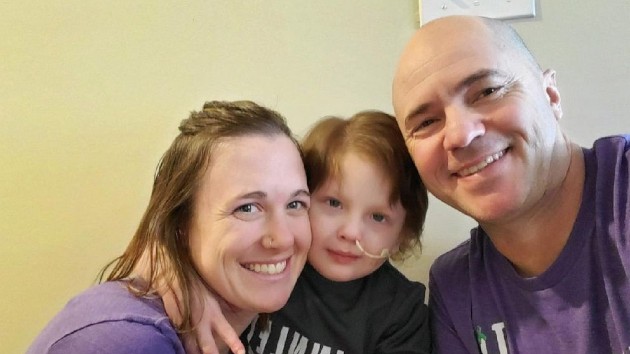Katie Whitmore(NEW YORK) — A 5-year-old girl who has been hospitalized for most of her young life due to a rare condition was recently cleared by doctors to “be normal” and do anything a normal kid her age can do, like going to school and playing outside.One of the first stops Finnley Foster made in her newfound freedom was to watch her dad, Pat Foster, a high school basketball referee, officiate a game in their hometown of Great Falls, Montana.”She loved watching games on TV and this time it was right then and there,” Pat Foster told ABC News’ Good Morning America. “It was really overwhelming to see the excitement in her eyes.””We had to lock the wheelchair a few times because she wanted to come out on the court and chase me down,” he said of Finnley, who wore a shirt to the game that said “My dad is my superhero.”Finnley had not been to one of her dad’s basketball games in over three years after being diagnosed at 6 months old with a rare form of severe combined immunodeficiency (SCID), which is caused by mutations in genes involved in the development of immune cells. It is a fatal condition unless treated by immune-restoring treatments, according to the National Institute of Allergy and Infectious Diseases.Finnley’s condition was so severe she had to be treated at Seattle Children’s Hospital, more than 600 miles from her family’s home, according to Finnley’s mom, Katie Whitmore.Nearly one year after being diagnosed with SCID, Finnley was also diagnosed with mycobacterium avium complex (MAC), which is caused by bacteria, according to the National Institutes of Health (NIH), and is dangerous for people with weakened immune systems, like Finnley.Finnley underwent her first bone marrow transplant in October 2017 at age 2 thanks to a donor found through the Be The Match registry.Two months later, the toddler was diagnosed with sepsis and faced a grim prognosis.”We truly didn’t know if Finnley was ever going to wake up,” Whitmore said.Finnley recovered but then doctors discovered her first bone marrow transplant was not successful. She underwent a second one in January 2019 with cells donated from the same donor, according to Whitmore.That transplant proved successful and more than one year later, on Feb. 14, 2020, Valentine’s Day, she got the all-clear to go home to Montana.”She can go to school, go to restaurants, go swimming, do anything,” said Whitmore. “We’ve been waiting Finnley’s entire life to hear that, basically.”At home in Montana, Whitmore said their family and friends are able to see first-hand the special bond Finnley has with not just her mom but her dad too. She dressed up in basketball referee uniforms while in the hospital and would watch games with him on TV and online.”The bond between Finnley and her dad is unbelievable,” Whitmore said. “She is a daddy’s girl.”Foster had to continue to work as a referee on a scaled-back basis when Finnley was in the hospital. He said there was “always something missing” from his games when she was gone.”Then I walked into the gym and saw Finnley and there sat my daughter, looking like a normal kid,” he said.
Copyright © 2020, ABC Audio. All rights reserved.












